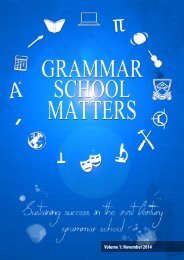Volume 1: November 2014
You also want an ePaper? Increase the reach of your titles
YUMPU automatically turns print PDFs into web optimized ePapers that Google loves.
HT5: Developing Précis<br />
Skills<br />
My aim was to produce a<br />
targeted set of resources to<br />
improve our students’ précis<br />
skills. For our purpose, a précis<br />
was a concisely written piece<br />
of text, whether it is an answer<br />
to a question or a summary of<br />
a longer piece of text. This was<br />
seen as a necessary skill as our<br />
students need to be able to write<br />
effectively and efficiently in<br />
exam conditions. Additionally,<br />
when accessing journal articles<br />
and revising, students need to<br />
be able to summarise longer<br />
texts without losing the essential<br />
information. As a result, subject<br />
departments were given a set of<br />
examples and asked to create<br />
their own which could then be<br />
shared by the whole school.<br />
HT6: Encouraging Reading<br />
My aim for the last half-term<br />
was to encourage our students<br />
to read and to widen the type<br />
of reading that they undertake.<br />
This will hopefully inspire<br />
more reading which obviously<br />
has extensive literacy benefits.<br />
This also utilised the increased<br />
number of registration slots due<br />
to the examination period and<br />
the work carried out on our<br />
school hall.<br />
For Years 11-12:<br />
Students were encouraged to<br />
carry out reading which would<br />
benefit their personal projects<br />
in Year 11. In Year 12, they were<br />
advised to focus on books that<br />
they could mention in their<br />
UCAS personal statement or<br />
which would aid their Extended<br />
Projects.<br />
For Years 7-9:<br />
Students were encouraged to<br />
read in two formal sessions a<br />
week. One registration session<br />
a week was designated for silent<br />
reading of their current fiction<br />
book. When I trialled this with<br />
my tutor group, the whole group<br />
nearly always brought a book<br />
with them and we managed<br />
about 15 minutes of silent<br />
reading following registration.<br />
The second session consisted<br />
of introducing the students<br />
to different types of reading.<br />
Each week students were given<br />
a double-sided A3 sheet with<br />
examples of different reading<br />
types such as sport literature<br />
and ancient texts. Students were<br />
encouraged to read these to get<br />
a flavour of the genre, and tutors<br />
could open this up to discussion<br />
if they wished.<br />
HOMEWORK<br />
TO SUPPORT<br />
LEARNING<br />
Rex Stidwell<br />
and that children should be<br />
allowed to be children. The<br />
provision of excessive homework<br />
should not prohibit reasonable<br />
involvement in activities such<br />
as sports clubs, learning an<br />
instrument or girl guides/scouts.<br />
similar idea is called “Take Away<br />
Homework”. See here for more<br />
information and ideas.<br />
Policy guidance points that could<br />
be covered with un-homework/<br />
takeaway homework:<br />
• Teachers are encouraged to<br />
make homework novel, creative,<br />
motivational and interesting<br />
• Teachers are encouraged to<br />
give students more choice in<br />
the tasks they complete for<br />
homework<br />
So why not have a go at producing<br />
a homework Takeaway menu for<br />
your department?<br />
What is the value of homework?<br />
- It’s a subject that has divided<br />
teachers for decades. Does<br />
setting homework add any<br />
value to a pupil’s learning or is<br />
it an unnecessary distraction<br />
that puts pressure on young<br />
people? And if it is set, how<br />
long should students be<br />
expected to spend on it? With<br />
Government guidelines on<br />
home study now removed,<br />
the setting of homework has<br />
become a matter for schools to<br />
decide individually. (Leader<br />
Magazine, June 2012)<br />
At Colyton we also have an<br />
increasing body of evidence<br />
from student voice surveys,<br />
along with feedback from<br />
parents and teachers, that we<br />
can improve the homework<br />
provision across the school. A<br />
staff Twilight training session<br />
highlighted the need for quality<br />
rather than quantity, time to do<br />
work well, and connection and<br />
relevance to the work completed<br />
in class.<br />
It was decided that we shouldn’t<br />
be setting too much homework<br />
So, what’s new? Following on<br />
from a large scale consultation of<br />
stakeholders last year (students,<br />
parents and staff) the whole<br />
school policy has been revised<br />
to include guidance points and<br />
absolutes. This is arguably a<br />
bit draconian but we feel that<br />
we need to have the students’<br />
interest at heart.<br />
Two of the guidance points<br />
could be tackled with the idea<br />
of “Un-homework”, espoused<br />
in the book of the same name<br />
by Mark Creasy. Another very



